
“Happiness is a state of mind, you know. I don’t think you are permanently happy. One is happy about certain things and not so happy about others.”
—Indira Gandhi
Our Approaches
Cognitive Behavioral Therapy (CBT) is a treatment modality with substantial research supporting its efficacy. CBT focuses on the relationship between our thoughts, emotions, and behaviors and teaches strategies for challenging maladaptive thoughts and beliefs, habituating to overwhelming emotions and sensations, and behaving in ways that align with our goals and values. CBT is designed to be a short-term approach to symptom reduction and is particularly effective for depression, anxiety, OCD, chronic pain, and eating disorders.
Dialectical Behavior Therapy (DBT) is the treatment of choice for disorders of emotion regulation. DBT is an evidenced-based treatment originally developed for adults with Borderline Personality Disorder and has shown to be effective in treating adolescents and adults with suicidal ideation, self-injury, eating disorders, addictions, and/or serious relational problems.
DBT is a behavioral approach that targets behaviors the client has identified as impeding progress toward his or her goals. Balance, mindfulness, and living according to one's values are also emphasized. The ulitmate goal in DBT is to help the client build a life worth living.
DBT is an intensive treatment using several modes of therapy including:
-DBT Skills Group (90 minutes weekly)
-Individual Therapy (45 minutes weekly)
-Phone Coaching (as needed between sessions)
-Family Intervention (as needed)
In recent years, DBT has emerged as the front line treatment for suicidal and self-harming adolescents. Stage 1 DBT specifically aims to eliminate target behaviors of emotion dysregulation including self-harm, eating disorders, substance abuse and aggression. The adolescent DBT program includes all of the standard components of DBT with an additional focus on providing support and guidance to the family.
Adolescent DBT includes:
- Individual therapy (45 minutes; weekly)
- DBT Skills Training Group (90 minutes; weekly)
- Phone coaching (as needed)
- 14 week Parent Skills Training group
- Parent consultation/coaching (as needed)
Many individuals who have experienced violence, abuse, sexual assault or other traumatic events notice lasting impacts that fall under the category of post-traumatic stress. The two therapeutic approaches most supported in the literature are Cognitive Processing Therapy (CPT) and Prolonged Exposure (PE). Both treatments are grounded in CBT principles and are shown to be effective in reducing or eliminating PTSD symptoms. CPT focuses on helping you see how your thoughts may be interfering with your healing from PTSD, while PE focuses on exposing you to what your fear most about the traumatic event(s), and what you may be avoiding as a result of the traumatic event(s). You can discuss with your therapist which treatment might be a better fit for you.
Acceptance & Commitment Therapy
Acceptance and Commitment Therapy (ACT) is a transdiagnostic approach focused on helping individuals approach their painful thoughts and emotions in a more adaptive way. A mindfulness-based approach, ACT teaches patients to make contact with painful experiences rather than avoiding them and to stay engaged in value-driven behavior despite these experiences. By experiencing that which we are avoiding, we unlock the outcome we could not otherwise achieve. For example, if one learns how to have the experience of rejection, they can actively pursue dating or making friends. The goal in ACT is to have the experiences we are unable to have so that we can build and sustain a satisfying life.
EFT is scientifically proven to strengthen loving relationships, even among couples stuck in conflict and disconnection. EFT is focused on understanding emotions, cycles of interaction within the couple, and fostering the skills of accurately understanding and expressing emotions related to attachment needs that are at the core of relationships--sensing that you can count on your partner to be there and respond to you.
“Wisdom and freedom require the ability to allow the natural flow of emotions to come and go, experiencing emotions but not being controlled by emotions.”
— Marsha M. Linehan

